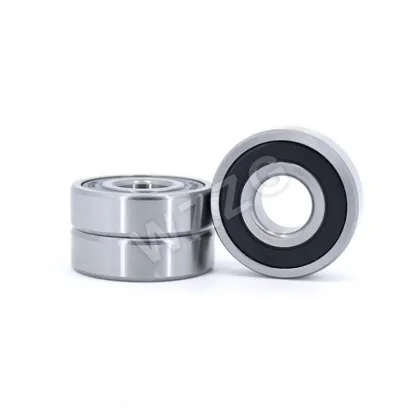Bearings in Industrial Applications: Navigating the Machinery Landscape
Bearings serve as indispensable components in various industrial applications, providing critical support and facilitating motion within machinery. This comprehensive guide explores the diverse roles and applications of bearings across industries.
1. What are Bearings and How Do They Work?
Bearings are mechanical components that enable relative motion between two components, typically rotating or linear movements. They reduce friction, allowing smooth and efficient operation of machinery. The basic principle involves minimizing contact between moving parts through the use of rolling elements.
2. Types of Bearings: A Brief Overview
Ball Bearings: Common in applications with radial and thrust loads, ball bearings use spherical rolling elements.
Roller Bearings: Utilizing cylindrical, tapered, or spherical rollers, these bearings handle heavier loads and provide stability.
Thrust Bearings: Designed for axial loads, thrust bearings are crucial in applications where forces act parallel to the shaft.
Plain Bearings: Also known as bushings, these bearings involve sliding surfaces and are suitable for light to moderate loads.

3. Industrial Applications of Bearings:
Bearings for Automotive Industry: Bearings are integral in vehicle components such as wheels, engines, and transmissions, ensuring smooth rotation and reducing friction.
Bearings for Aerospace Industry: Critical in aircraft components, bearings contribute to the performance of engines, landing gear, and control systems.
Additional resources:What is the purpose of the ball valve?
Unveiling Top Drilling Equipment Brands in USA
The Ultimate Guide to Rubber Brake Cups
Unlocking the Secrets of Ball Bearing Deep Groove: Enhanced Performance & Durability Explained
Which black rubber U-channel offers the best price for purchase stage?
What is manipulator in welding?
Ultimate Kit: Essential Copper Crush Washer Set
Bearings for Manufacturing and Machinery: Bearings are ubiquitous in manufacturing equipment, including conveyor systems, pumps, and gearboxes, enhancing overall operational efficiency.
Power Generation: Bearings support turbines, generators, and various components in power plants, withstanding high temperatures and loads.
Bearings for Medical Equipment: Precision bearings play a vital role in medical devices like MRI machines, ensuring accuracy and reliability.
4. Factors Influencing Bearing Selection:
Load Capacity: Different applications require bearings with varying load capacities to withstand forces exerted during operation.
Speed Ratings: Bearings must match the rotational speed of the machinery to prevent overheating and premature wear.
Temperature Resistance: In environments with extreme temperatures, selecting bearings that can withstand and operate efficiently is crucial.
Corrosion Resistance: For applications in corrosive environments, corrosion-resistant bearings extend the lifespan of machinery.
5. Maintenance and Lubrication: Proper maintenance and lubrication are paramount to extending bearing life. Regular inspections, timely replacements, and the use of suitable lubricants contribute to optimal bearing performance.
Conclusion: In conclusion, bearings are indispensable components that underpin the functionality of diverse machinery across industries. Understanding the types, applications, and factors influencing bearing selection is essential for engineers, maintenance professionals, and anyone involved in the design and operation of mechanical systems. As technology evolves, so too will the role and significance of bearings in shaping the landscape of industrial applications.
What is the function of the Pilot Operated Sequence Valve?
What happens when oil control valve goes bad?
Which investment casting method offers the best precision for watch parts?
How are freeze plugs installed?
What are the advantages of buying cylindrical roller bearing PDFs for a successful B2B purchase?
A Complete Guide To Aluminum Extrusion
What are the top 5 reasons to choose Edge Trim for your purchase?
232
0
0
Related Articles
-
192
0
0
-
80
0
0
-
106
0
0
-
77
0
0
-
101
0
0
-
Which industries will benefit most from HardFace Technologies?
Which Industries Will Benefit Most from HardFace Technologies?
235
0
0
-
76
0
0
-
99
0
0









Comments
All Comments (0)